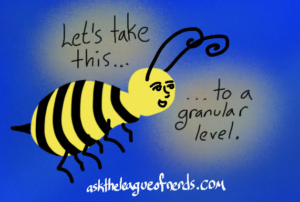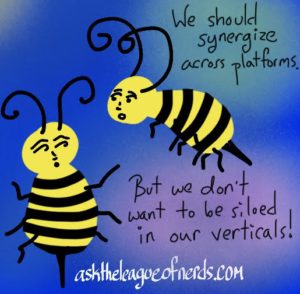You people got a word for two-dollar words that suddenly appear everywhere, like a fad? Want to coin one? And does anybody track these things?
Delphine Sultzer
***
Sure. We’ve got several words, actually. But most of them have to do with how a new word is formed, rather than that sense that the word is dropping from every overpriced consultant’s mouth this week and will have vanished by the next. For that, there’s only one word, and it’s the one you already know: buzzword.
 The crucial characteristic of the buzzword is that it is vacuous. The word had meaning at some point, may even have been carefully defined and useful within some tightly-knit professional or academic cabal, but now it is out running wild. It stops being a way to inform and starts being a way to impress. A marker of status, a way of listing oneself as a member of the elite group of People Who Use Words Like These.
The crucial characteristic of the buzzword is that it is vacuous. The word had meaning at some point, may even have been carefully defined and useful within some tightly-knit professional or academic cabal, but now it is out running wild. It stops being a way to inform and starts being a way to impress. A marker of status, a way of listing oneself as a member of the elite group of People Who Use Words Like These.
Though of course, rolling one’s eyes at buzzwords and making snide comments like those in the previous paragraph are ways of listing oneself in the elite group of People Who are Far Too Clever and Yet Down-to-Earth to Be Impressed By Such Frippery. Groups beyond groups, y’all. It’s human nature.
Anyway, your more linguistics-y terms have to do with a word’s origin, and various origins can lead to both buzzword and non-buzzword popularity. A handful of examples:
Vogue words. These are words we’ve had in the background of the language for ages that suddenly come to the fore. Usually they’ve had some sort of meaning extension, from whatever the original idea was into some vaguely buisnessy connotation. “Paradigm” and “synergy” belong here. And I’d be remiss not to mention buzz phrases, where each of the original words is old, but the combination is new and buzzy. “Culture shift” for a change in managerial style. “On a going-forward basis” for “from now on.” “Thinking forwardly.” “Reaching out” to whatever demographic instead of advertising to them. And a thousand different euphemisms for “fired.”
 Affixation. Similar to buzz phrases, but instead of old words, these are old bits of words, attached to each other in new ways. “Impactful” is one that tends to make people scream – same old “impact,” and the same “-ful” as in a thousand other words, but the combo grates on a lot of nerves. Words with “-ize” are liable to be here too: “incentivize,” “monetize.”
Affixation. Similar to buzz phrases, but instead of old words, these are old bits of words, attached to each other in new ways. “Impactful” is one that tends to make people scream – same old “impact,” and the same “-ful” as in a thousand other words, but the combo grates on a lot of nerves. Words with “-ize” are liable to be here too: “incentivize,” “monetize.”
Change in part of speech. Usually a noun becomes a verb, sometimes a verb becomes a noun, and occasionally adjectives get in on the action too. This is where you have people solutioning problems or bootstrapping startups.
Acronyms. Not a ton of these, though being “ISO-compliant” was one in engineering circles for a while, as Scott Adams duly noted. Plenty of acronyms are part of modern slang, like “lol” or “af,” but not many are buzzwords.
Neologisms. These are completely made-up words, sometimes created for a joke, sometimes a scifi or fantasy invention that’s slipped into the general vocabulary. Like “expelliarmus” or “lightsaber.” I can’t think of a single one that’s achieved buzzword status – no higher-up has ever asked me if I grokked her point. More on neologisms here.
As far as tracking, there are several good databases of neologisms, but they tend towards the slang rather than the buzz. Your best bet is probably Forbes magazine online. They do a NCAA-style bracket of the most irritating buzzwords each year, and the comments are full of all sorts of strange balderdash.
I don’t have any great coinages in mind myself at the moment, but I’ll share one I heard before and liked: “consumer crafting anticipation expenditure variable” for “the reluctance to buy things because you’re going to make them yourself.” That’s good stuff, right there. Whoever came up with that must’ve been pretty damn sharp.
With love,
The Language Nerd
Got a language question? Ask the Language Nerd! asktheleagueofnerds@gmail.com
Twitter @AskTheLeague / facebook.com/asktheleagueofnerds
Fundamentals, as usual, from David Crystal’s Cambridge Encyclopedia of the English Language. About.com has a nice collection of buzzwords, with great examples, though mine mostly came just from asking people around me what that were seeing in their company emails. And here’s the Forbes link again.
A neologism that I recently read and liked is “voluntourist”. It is used to indicate people who travel to remote third-world areas to supposedly help, but mostly just leave things as they were upon departure. But they go home with photos of the “good” they did.
PS: It was coined by one of the people who lived in the “benefited” third world area.
Oooooh, “voluntourist.” That is exactly the word I needed to describe the cousin who keeps extorting money from our family members to fund her vacations to India. Nothing quite like applying a liberal coat of Jesus, mercy, or tax write-off to your plea for other people to pay for your trip. This was a particularly good question. The health care profession has become really, really good at acronyms as words. We have a bit of bleed over into the general populous, but mostly among people who are chronically ill or hypochondriacs. NSAIDS pronounced “ensedds” for non-steroidal anti-inflammatory drugs, DOA, and cat scan (although for the life of me I don’t understand what a feline has to do with computerized topography) are some I can think of off the top of my head.
Language Nerd, how would you describe a word or phrase that has been kidnapped from another industry? For example, we use “frequent flyer” in the ER to describe patients that come in all the time for non-emergency situations or “kicking the tires” to describe someone who is asking about a procedure but has no intent to actually do it.